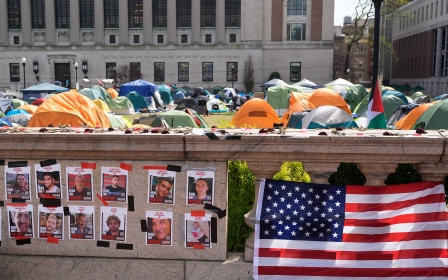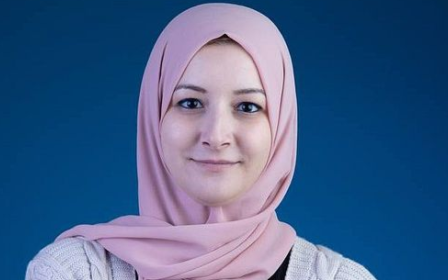Author Jhumpa Lahiri praised for rejecting NYC museum award over keffiyeh ban
Social media users around the world have showered praise on Pulitzer Prize-winning author Jhumpa Lahiri after she declined to accept an award on Wednesday from a New York City museum that fired employees for wearing keffiyehs, the black-and-white chequered scarf that has become a symbol of Palestinian solidarity.
The author was due to receive the Noguchi Museum's prestigious 2024 Isamu Noguchi Award, which recognises highly accomplished individuals who share Japanese-American sculptor Isamu Noguchi’s spirit of innovation, imagination and commitment to creativity.
However, a statement emailed by the museum on Wednesday said that “Jhumpa Lahiri has chosen to withdraw her acceptance of the 2024 Isamu Noguchi Award in response to our updated dress code policy. We respect her perspective and understand that this policy may or may not align with everyone’s views.”
In August, the Noguchi Museum, which was founded almost 40 years ago by the artist Isamu Noguchi and is in the borough of Queens, fired three employees and announced they could not wear clothing or symbols that express overt political messages, slogans or symbols during office hours.
Lahiri’s readers, as well as pro-Palestinian activists, praised the author for having a “principled” and “moral” stance and underlined the potential influence of such a move by a respected icon in the literary world.
New MEE newsletter: Jerusalem Dispatch
Sign up to get the latest insights and analysis on Israel-Palestine, alongside Turkey Unpacked and other MEE newsletters
Other users showed support by praising Lahiri’s works and promoting her books.
Pulitzer Prize-winning author #JhumpaLahiri declined to accept an award from New York City's Noguchi Museum after it fired three employees for wearing keffiyeh headscarves, an emblem of Palestinian solidarity, following an updated dress code. More power to her. She has always… pic.twitter.com/3mbXwjuZ8R
— Syed Hassan Kazim سید حسن کاظم (@iamshk92110) September 26, 2024
“Palestine is a cause that is separating artists from artistic business people,” said Hend Amry on X.
Palestine is a cause that is separating artists from artistic business people. https://t.co/QwWn2bTVDL
— Hend Amry (@LibyaLiberty) September 26, 2024
One social media user pointed out the irony in this situation, saying that Noguchi would have supported wearing keffiyehs and would be protesting against the museum's conduct if he were alive today.
I knew I loved her!! Her collection of short stories, Interpreter of Maladies remains my favorite. Go grab a copy from your local bookstore! https://t.co/jh2Na8xwru
— Mindful Madness (@Kaitlin_La) September 26, 2024
The daughter of Indian immigrants, Lahiri was born in London and moved to the United States when she was three.
In 2000 she won the Pulitzer for fiction for her debut story collection, Interpreter of Maladies. She has since published several books of fiction and nonfiction in English and Italian, after living in Rome, Italy.
Lahiri is also the director of the creative writing programme at Barnard College, Columbia. The New York women's college was under public scrutiny in recent months for deleting a post on its Instagram account featuring a Barnard student who is seen holding up the latest issue of ArabLit Quarterly.
The issue's front cover showed a flower-filled map of occupied Palestine, with flowers blooming out of Gaza.
The keffiyeh scarf has become a symbol of Palestinian self-determination across the world, with many protesters wearing it in solidarity with the people of Gaza while demanding an end to Israel’s war on the besieged enclave.
In many instances, universities and public institutions have issued bans on the keffiyeh over the last year of the war on Gaza, with many public figures wearing it despite receiving backlash.
Middle East Eye delivers independent and unrivalled coverage and analysis of the Middle East, North Africa and beyond. To learn more about republishing this content and the associated fees, please fill out this form. More about MEE can be found here.




